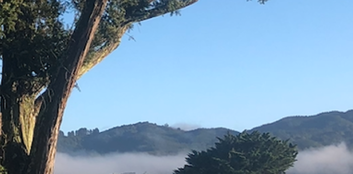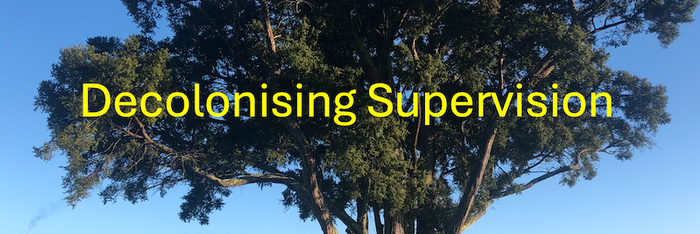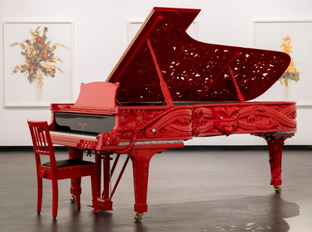Decolonising Supervision
Developing a community of practice - he whatunga - around the kaupapa of "decolonising supervision".
He aha ai? Why “decolonising” supervision?
Attempting precise definition seems by definition a colonial impulse. Maybe we might talk about ‘holy desire’ – wawata tapu – movement toward, intentionality, that inner shove to not rest too easy but to step beyond what we know already. Those of us who follow Jesus recognise this shove and trust it. So, the movement I describe as “decolonising” is a desire for greater integrity, more maturity, in my self, in my work. But it is not a solo sport. I need friends. I long for people to step forward with, to step closer toward. It seems few of us can see very far, so we need to share what we see, what we feel, what we long for, and we trust that Wairua Tapu meets us there.
“Decolonising Supervision” is a desire to go beyond tick-boxing, deeper than ‘cultural competence’, to grow out of rule-keeping or trying to please others or avoid criticism. For me, it’s about growing up, as a Pākehā, he wahine, he minita, as I encourage other people in their work. It’s about honouring the Treaty, Te Tiriti o Waitangi, exploring ways to embody this in our day-to-day.
Supervision matters because it is increasingly becoming a vital component for kaimahi across the community sector, including the church. Organisations make a large investment in supervision, both paying for it and providing time for it, and have large expectations of supervision providing both personal support and professional development, including in cultural competence. Yet ‘professional’ or ‘clinical’ supervision has its roots in western individualistic models of training, accountability and oversight. I think that we need to critically evaluate the ‘whakapapa’ of supervision in order for it to be an excellent tool and process for all Māori and Tauiwi working in the ‘people-professions’ in Aotearoa.
What do we mean by ‘decolonising’ supervision?
How might we honour Te Tiriti of Waitangi through the work of supervision?
“Decolonising Supervision” is a desire to go beyond tick-boxing, deeper than ‘cultural competence’, to grow out of rule-keeping or trying to please others or avoid criticism. For me, it’s about growing up, as a Pākehā, he wahine, he minita, as I encourage other people in their work. It’s about honouring the Treaty, Te Tiriti o Waitangi, exploring ways to embody this in our day-to-day.
Supervision matters because it is increasingly becoming a vital component for kaimahi across the community sector, including the church. Organisations make a large investment in supervision, both paying for it and providing time for it, and have large expectations of supervision providing both personal support and professional development, including in cultural competence. Yet ‘professional’ or ‘clinical’ supervision has its roots in western individualistic models of training, accountability and oversight. I think that we need to critically evaluate the ‘whakapapa’ of supervision in order for it to be an excellent tool and process for all Māori and Tauiwi working in the ‘people-professions’ in Aotearoa.
What do we mean by ‘decolonising’ supervision?
How might we honour Te Tiriti of Waitangi through the work of supervision?
Showing Up: Lived Experience

I step into a professional conversation with another person fully myself and fully confident that I’m in the right place at the right time. Pastoral care, counselling and supervision all require that we show up and be fully present in that moment, for that person. No matter what else might be going on in my life I come to each conversation with an attitude of love merged with calm curiosity, merged with trusting that I have something to offer. And yet, self confidence is not enough.
No matter how caring and competent we are, we are still embedded in patterns of inequity. Two centuries of colonisation has formed us as individuals within systems that produce very different outcomes for people, based on their cultural background. My whiteness places me within intergenerational privilege of education, power, property and security. Colonial history is packed with well-meaning white people feeling good about themselves ‘helping’ brown people. I am confronted with Linda Tuhiwai-Smith whose challenge about research seems to apply equally to the helping professions:
“Belief in the ideal that benefiting mankind is indeed a primary outcome of scientific research is as much a reflection of ideology as it is of academic training. It becomes so taken for granted that many researchers simply assume that they as individuals embody this ideal and are natural representatives of it when they work with other communities. Indigenous peoples across the world have other stories to tell which not only question the assumed nature of those ideals and the practicalities that they generate, but also serve to tell an alternative story.”[i]
Showing up as a Pākehā supervisor asks of me to not just rest in my good intentions. The comfort in my own skin must be held in tension with a discomfort of being in my white skin, because being white shapes everything I do and say, think or feel. I have little interest in the twisting of guilt but I have a lot of interest in growing into a maturity of personal lived experience and professional practice that undermines injustice. I don’t have much idea yet how to do that, but I believe it is possible. I suspect that it means showing up to each and every conversation fully and truly me, in ways that enable others to be fully and truly themselves, as together we loosen, little by little, the ties of colonial assumptions and power inequality.
Components of Decolonising Practice
I’m trying to tease into this and identify specifics: what might decolonisation look like in practice? At this point I can see five commitments that I want to make. But I grapple with my own need to create categories with components as though this were a machine or a science experiment. I cannot escape the Western desire to understand things by disection, cutting them up into bits and naming sets and sub-sets. Words enable us to translate what we know into constructs that can be shared and critiqued and analysed. Which is good, but also threatens to do violence to the substance itself. My best hope is that these kupu and whakaaro of mine might be sacrament, outward visible signs of inward invisible grace, a fragment of bread resting in an open hand. But to even claim these as “mine” is itself a Western way of knowing. Me, I, mine reveals a sense of self that is profoundly shaped by colonisation.
Oh dear. Perhaps I am tangling myself in knots. I look at my skin. It is ‘white’ with spots of brown (I was a freckly kid), and now I’m aging so my skin is getting wrinkly with pink blotches. My skin links me back through many generations to the North. No good wishing for different skin. I am who I am. I value the inter-connection of skin, sense, touch, containing, stretching. It’ll do.
So, five commitments, each which confronts a foundational aspect of colonisation.
1. to let go of the illusion of objectivity
2. to see the dynamics of power at work
3. to cherish Spirit
4. to make space for hidden forms of knowing
5. to benefit Māori
No matter how caring and competent we are, we are still embedded in patterns of inequity. Two centuries of colonisation has formed us as individuals within systems that produce very different outcomes for people, based on their cultural background. My whiteness places me within intergenerational privilege of education, power, property and security. Colonial history is packed with well-meaning white people feeling good about themselves ‘helping’ brown people. I am confronted with Linda Tuhiwai-Smith whose challenge about research seems to apply equally to the helping professions:
“Belief in the ideal that benefiting mankind is indeed a primary outcome of scientific research is as much a reflection of ideology as it is of academic training. It becomes so taken for granted that many researchers simply assume that they as individuals embody this ideal and are natural representatives of it when they work with other communities. Indigenous peoples across the world have other stories to tell which not only question the assumed nature of those ideals and the practicalities that they generate, but also serve to tell an alternative story.”[i]
Showing up as a Pākehā supervisor asks of me to not just rest in my good intentions. The comfort in my own skin must be held in tension with a discomfort of being in my white skin, because being white shapes everything I do and say, think or feel. I have little interest in the twisting of guilt but I have a lot of interest in growing into a maturity of personal lived experience and professional practice that undermines injustice. I don’t have much idea yet how to do that, but I believe it is possible. I suspect that it means showing up to each and every conversation fully and truly me, in ways that enable others to be fully and truly themselves, as together we loosen, little by little, the ties of colonial assumptions and power inequality.
Components of Decolonising Practice
I’m trying to tease into this and identify specifics: what might decolonisation look like in practice? At this point I can see five commitments that I want to make. But I grapple with my own need to create categories with components as though this were a machine or a science experiment. I cannot escape the Western desire to understand things by disection, cutting them up into bits and naming sets and sub-sets. Words enable us to translate what we know into constructs that can be shared and critiqued and analysed. Which is good, but also threatens to do violence to the substance itself. My best hope is that these kupu and whakaaro of mine might be sacrament, outward visible signs of inward invisible grace, a fragment of bread resting in an open hand. But to even claim these as “mine” is itself a Western way of knowing. Me, I, mine reveals a sense of self that is profoundly shaped by colonisation.
Oh dear. Perhaps I am tangling myself in knots. I look at my skin. It is ‘white’ with spots of brown (I was a freckly kid), and now I’m aging so my skin is getting wrinkly with pink blotches. My skin links me back through many generations to the North. No good wishing for different skin. I am who I am. I value the inter-connection of skin, sense, touch, containing, stretching. It’ll do.
So, five commitments, each which confronts a foundational aspect of colonisation.
1. to let go of the illusion of objectivity
2. to see the dynamics of power at work
3. to cherish Spirit
4. to make space for hidden forms of knowing
5. to benefit Māori
Faith and Wairuatanga: See and hearnā Silvia Purdie - a personal reflection
I’m adamant that deconolising the mind requires energising the soul. Pākehā embedded in secularisation start this journey with a handicap, blind to spiritual reality. Jesus’ question has rung through my entire life: “Do you have eyes, but fail to see?” (Mark 8:18). I have been trained to see with inner eyes, and hear with inner ears.
|
Colonisation enforced some ways of seeing and hearing, and banned others. The colonial church directed its gaze toward a vision of faith and heaven that looked a lot like rural England, floating and disconnected from this land here, that encouraged the effort to cut and burn and dig and build this land so it more closely resembled that image. But in every generation people of faith saw through the colonial vision with brutal clarity. My tīpuna wahine walked the streets of North Canterbury with petition after petition calling for the right to vote. They realised that colonial government was not designed to benefit women. My father willingly surrendered himself to be imprisoned by the military in 1941, after evading arrest long enough to hold his new-born son, because Dad saw through the pro-war rhetoric and was convinced that following Jesus meant standing for peace. We look back to look forward, just as the Bible again and again calls people to remember how God came through for them in the past in order to see God’s work in the present and trust God’s presence in the future.
For Māori, looking back to look forward means navigating their relationship with both ‘Ngā Atua Māori’ and ‘Te Atua Karaitiana’. Many are rejecting the latter in favour of the former, from the conviction that Christ is too packaged up with colonisation to be of any use. Others are finding ways to disentangle Jesus and let him speak on his own terms. For myself, the points of resonance between Atuatanga Māori and Christian theology create space to breathe, and to work with confidence as a minister and supervisor. I have no need to iron out the differences, but I am grateful that the two worlds are not poles apart. I do not whakapapa to Papatūānuku, but I have a strong relationship with the Earth, who in my tradition is named Mother. I worship God named in our scriptures as Father, “tō mātou Matua i te Rangi” (Matthew 6:9).
What I observe is that ancestral connection to this land brings a fluid nature to faith. ‘Māori-ness’ seems to carry an invitation to walk to the source of the river, the water that falls from the sky and the water that comes out from the earth, the wai rua that flows from here and from there to mingle together and form a living river.
My ancestors brought faith to New Zealand in the form of the piano: a large heavy wooden box, manufactured in Europe, to enable them to sing the Lord’s song in a strange land.[i] ‘Pākehā-ness’ forms faith through complex interactions of individual notes, at its best a shared harmony enabled by finely tuned precision. The piano gives voice to vast volumes of musical heritage as well as enabling innovation, to express and evoke emotions, including worship.
Supervision draws on our spiritual heritage, not to impose mine on yours, but to enable your own flow of music to inspire and inform your work.
[i] Historical research by Michael Brown concluded that by 1916 over 100,000 pianos had been imported into Aotearoa, enough for a piano in every church, school and hall and in over 40% of homes. Pianos were expensive, £33 in 1877 is over $6,000 today. Brown describes the piano as “domestic and spiritual furniture,” which expressed the central role of women in family and faith, as well as a “symbol of permanency,” colonial confidence as “post-settler Pākehā generations felt they were truly here to stay.”
Brown, M, ‘A Piano in Every Other House’? The piano in New Zealand trade statistics, 1877–1931,’ New Zealand Journal of History, 51, 2 (2017).
For Māori, looking back to look forward means navigating their relationship with both ‘Ngā Atua Māori’ and ‘Te Atua Karaitiana’. Many are rejecting the latter in favour of the former, from the conviction that Christ is too packaged up with colonisation to be of any use. Others are finding ways to disentangle Jesus and let him speak on his own terms. For myself, the points of resonance between Atuatanga Māori and Christian theology create space to breathe, and to work with confidence as a minister and supervisor. I have no need to iron out the differences, but I am grateful that the two worlds are not poles apart. I do not whakapapa to Papatūānuku, but I have a strong relationship with the Earth, who in my tradition is named Mother. I worship God named in our scriptures as Father, “tō mātou Matua i te Rangi” (Matthew 6:9).
What I observe is that ancestral connection to this land brings a fluid nature to faith. ‘Māori-ness’ seems to carry an invitation to walk to the source of the river, the water that falls from the sky and the water that comes out from the earth, the wai rua that flows from here and from there to mingle together and form a living river.
My ancestors brought faith to New Zealand in the form of the piano: a large heavy wooden box, manufactured in Europe, to enable them to sing the Lord’s song in a strange land.[i] ‘Pākehā-ness’ forms faith through complex interactions of individual notes, at its best a shared harmony enabled by finely tuned precision. The piano gives voice to vast volumes of musical heritage as well as enabling innovation, to express and evoke emotions, including worship.
Supervision draws on our spiritual heritage, not to impose mine on yours, but to enable your own flow of music to inspire and inform your work.
[i] Historical research by Michael Brown concluded that by 1916 over 100,000 pianos had been imported into Aotearoa, enough for a piano in every church, school and hall and in over 40% of homes. Pianos were expensive, £33 in 1877 is over $6,000 today. Brown describes the piano as “domestic and spiritual furniture,” which expressed the central role of women in family and faith, as well as a “symbol of permanency,” colonial confidence as “post-settler Pākehā generations felt they were truly here to stay.”
Brown, M, ‘A Piano in Every Other House’? The piano in New Zealand trade statistics, 1877–1931,’ New Zealand Journal of History, 51, 2 (2017).


